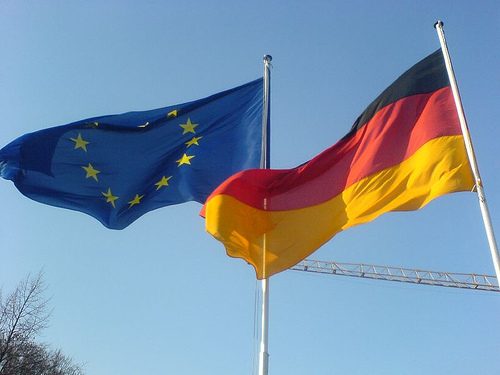 If Europe ever dies, Germany will have killed it.
If Europe ever dies, Germany will have killed it.
The community of values that Europe is supposed to be—one that claims to embody democracy and human rights and always gives preference to soft power over hard—can survive only as long as its largest state shares those values.
Russia is the test that Germany failed. As Vladimir Putin steered his country in an unabashedly authoritarian and neo-imperialist direction, Germany showered him with praise. When Chancellor Gerhard Schröder called Putin a “true democrat” at the height of Ukraine’s Orange Revolution in late 2004, he effectively declared democratic Ukraine’s Western aspirations incompatible with Germany’s relations with an authoritarian Russia and thereby repudiated democracy.
Last spring’s German declaration of solidarity with Putin’s opposition to Ukraine’s and Georgia’s possible NATO membership also revealed the triumph of hard-nosed geopolitics over democratic values and soft power. Chancellor Angela Merkel’s endorsement of the logic of Putin’s opposition—that foreign-policy decisions made by Ukraine’s democratically elected political elites are undemocratic while only those endorsed in popular opinion polls by its population are democratic—was a direct repudiation of Ukraine’s democratic institutions and a backhand endorsement of Putin’s dismantling of democracy in Russia. Her September 10th designation of Russia’s invasion of Georgia as a mere “controversy” that should not overshadow Germany’s “shared interests” with Russia went even further than Schröder in sacrificing non-Russian democracy to Russian dictatorship.
Germany’s indifference to democratic values is a puzzle. After all, Germany should know better. It devastated Ukraine, Belarus, and Poland in two world wars; it perpetrated the Holocaust along with a variety of other genocides against Roma and Slavs in Eastern Europe; and it was responsible for the deaths of almost 2 million Ukrainians in World War I and 8 million in World War II. (As Erich Koch, Hitler’s ruthless Reichskommissar of Ukraine, said, “I will pump every last thing out of this country. I did not come here to spread bliss.) One would have expected Germany to be especially sensitive to the democratic aspirations and security concerns of the peoples it came closest to annihilating. Instead, Germany has consistently preferred authoritarian Russia to its democratic non-Russian neighbors.
Gas goes some way in explaining Berlin’s preferential option for the Kremlin, but not quite. After all, the Eastern Europeans most critical of Russia—such as Poland and the Baltic states—are far more dependent on Russian gas than Germany. Lucrative pipeline deals and other commercial ties also don’t do the trick: economic logic should dictate a closer alliance with the United States, Germany’s largest trading partner, but instead German policy makers are frequently more anti-American in their rhetoric and policy than anti-Russian.
A closer look at history may help explain Germany’s anomalous behavior. In 1922, Weimar Germany signed the Treaty of Rapallo with Soviet Russia,thereby paving the way for extensive economic and military cooperation that isolated, and helped destabilize, the fledgling states of East Central Europe. In 1938, the Molotov-Ribbentrop Pact led to the division of Poland by Hitler and Stalin. Throughout the 1970s and 1980s, Germany willingly accepted Soviet hegemony in the satellite states (and even snubbed the Solidarity movement), in exchange for rapprochement with East Germany. The Schröder-Putin pipeline deal of late 2005 and Merkel’s endorsement of the logic of Putin’s opposition to Ukraine’s and Georgia’s integration into Euro-Atlantic structures continue this pattern.
In all five instances, radically different German regimes consistently pursued the same foreign policy goal. Whether unstable and democratic as in 1922, powerful and totalitarian as in 1938, stable and democratic as during the Cold War, or powerful and democratic as today—German elites, whether Christian Democrats, Social Democrats, or Nazis, forged alliances with an authoritarian Russia at the expense of their democratic neighbors in Eastern Europe. This overarching vision of Germany’s interests is unabashedly geopolitical, pointing to a possible reassertion in today’s Germany of the Realpolitik political culture that dominated German foreign policy after unification in 1871 and that produced the disasters of the two world wars.
It’s hard to see how Europe—whether as an ethical community or as the European Union—can survive Germany’s return to great-power thinking and politics. A truly democratic club of countries cannot unconditionally prefer authoritarianism to democracy in all its dealings with its eastern neighbors. A truly functioning EU—whether as a club of equals or as a super-state—cannot exist if its largest member is committed to its own interests above all others. (It was Schröder, after all, who in the run-up to the Iraq War declared that he would ignore a UN resolution to support the U.S. invasion.)
Since the problem is political culture, any effective solution must focus on it as well. The Holocaust points the way to just how German elites might be swayed to think differently about politics. The shame of six million dead Jews has kept Germany honest in its dealings with Israel. The shame of the millions of Poles, Ukrainians, and Belarusians who were killed in two world wars may be the only way to remind Berlin that it cannot just ignore the values and interests of the countries that lie east of Germany and west of Russia in its ruthless pursuit of self-interest. And the ethical community that is supposed to be Europe could only benefit from a recognition that human rights also exist outside the European Union’s current borders.
Alexander J. Motyl is a professor of political science at Rutgers University-Newark. Photo credit: Flickr user cauneUK.
